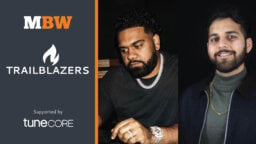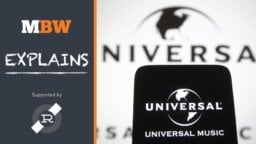Trailblazers is an MBW interview series that turns the spotlight on music entrepreneurs making waves in their local markets, who have the potential to become the global business’s power players of tomorrow. This time, we speak to Steve Rhodes, Co-Founder and CEO of UK-based ‘vinyl-on-demand’ startup, elasticStage. Trailblazers is supported by Believe.
Vinyl records are one of the music industry’s biggest comeback stories.
Once on the verge of being relegated to history’s list of obsolete technology, sales of the format are now thriving in the streaming age and growing in major markets.
In the US, for example, according to the RIAA, mid-year revenues (on a retail basis) from vinyl albums grew 22% to $570 million, while vinyl’s share of the physical market increased from 68% to 73%.
In the UK, as of September 2022, year-to-date, vinyl albums generated retail revenues of £80.9 million, up 12.2% YoY, according to stats published by the Entertainment Retailers Association.
Indeed, vinyl has become so popular with music consumers that manufacturers are coming under increased pressure to keep up with growing demand.
One company that believes it has the solution to long lead times in the vinyl manufacturing space is UK-based elasticStage.
The on-demand vinyl company raised £3.5 million in a seed round earlier this year (and is about to launch a series A Round), attracting investment from prominent industry figures like producers Paul Epworth (Adele, Paul McCartney) and Dan Grech-Marguerat (Lana Del Rey, George Ezra, Tom Grennan), plus artist managers Ryan Walter (Lewis Capaldi) and Tim Parry (co-founder of Big Life Management).
This year has also seen the company open a new 10,000 sq. ft. facility in London and hire music industry veteran Raoul Chatterjee (the ex-Vice President, Content Partnerships & Operations at SoundCloud) as its new Chief Operating Officer.
elasticStage’s co-founders Steve Rhodes (CEO) and Werner Freistaetter (CTO) are both former musicians and engineers.
Rhodes tells MBW that the company aims to “completely eliminate the costly and lengthy setup process for vinyl” and that “it was a no-brainer that many artists (beginners, professionals and post-major record deal artists) would love a way to seamlessly sell physical products to fans with no upfront cost – similar to what Amazon built for authors”.
He adds that elasticStage is not “simply a manufacturer” and that the business is “50% software and 50% hardware” focused.
He explains: “We built a platform that offers an end-to-end solution from music creator to vinyl buyer/consumer. Anyone can build, upload and commercialise a new release within minutes via a web browser or phone and start making money the same day.
“The process is super easy, you don’t need to register yourself as a label and we deal with all the important bits like issuing various label codes, dealing with mechanical payments, registering publishing rights and ensuring rightholders get their revenues delivered directly into their bank accounts.”
Here, Steve Rhodes tells us about challenges in the global vinyl production business, how elasticStage is trying to solve those issues with its vinyl-on-demand platform, and how the company has its sights set on expanding globally.
What are the biggest challenges in the global vinyl market currently?
The technology is almost unchanged from the last century and not fit for today’s market. It was built for hundreds of artists selling millions of records, but today we have millions of artists selling hundreds of records. Most of the engineers who truly understood vinyl are dead. The industry still uses Neumann machines to cut master disks that were built between 1960 and 1980 and it’s hard to get spare parts, impossible to buy one and there are only a handful of techs who can fix them if they break. Neumann’s chief engineer once told everyone that he would take all secrets to his grave and that’s exactly what he did.
We constantly hear about lead times for vinyl orders getting longer and longer. What differentiates elasticStage from other players in the market that allows you to speed up the process?
Traditionally, a skilled engineer has to cut a master disc on a lacquer plate; it’s a bit of a crap shoot. If the engineer has a bad day or is pressed for time you might end up with a terrible-sounding vinyl record. Then you have to rush the master disc to an electro-plating facility that makes a metal negative otherwise the lacquer will start to degrade. From the negative you have to make another positive and now you have a durable clone of the original master. Then you make another metal negative which becomes the stamper for a vinyl press.
You need to mount this onto a press, run a few tests and only then you are ready to produce records. Finally, a stamper only lasts for less than 1,000 copies at which point you have to go back to the electroplating facility and produce another stamper from the metal master. Not only do you end up with a very lengthy and costly setup process, you can also find yourself having to work with a 5th generation copy from the original master, where every additional step introduces artifacts and issues. Our 1-step process is much simpler, sounds better and is more environmentally friendly.
We basically make a master disc, fully automated, for every customer. We eliminated all the additional steps. We have no setup and once the user builds a release on our platform by uploading the music, providing the metadata and artwork, our factory is ready to produce a vinyl within 24 hours if a fan orders a copy. The whole experience is fully automated, elegant and seamless. Every record is always in stock and available as soon as the rights owner uploads it to our platform and makes it available for purchase on our store. Our platform is probably the most sophisticated release management system, integrated with a factory, store and D2C distribution – all in one place.
It can manage pre-orders, territorial availability, and supports local currencies and languages. Because it’s built as an extension of DDEX (a standardized data system for digital music), it can easily interface with the professional music industry.
elasticStage claims to be the world’s first on-demand vinyl manufacturer – tell us a bit more about the tech that underpins your operations?
We offer a robust customer service experience so your fans receive your vinyl. You can never lose money because you never need to pay for anything upfront. In terms of vinyl hardware, we have completely re-engineered the vinyl process by using modern technology. A big part of this is of course software. elasticStage owns all the IP, which we have been developing for many years, learning along the way that making vinyl records is still an engineering marvel! The engineers and scientists that worked on vinyl throughout the last century were some of the smartest people in the world. Some of them were literally rocket scientists coming from the elite universities in the world with PhDs.
We had to painstakingly research, re-discover and reverse-engineer a lot of the processes because so much of that knowledge was lost. We wanted to remain true to the basic ingredients that are responsible for the “sound” of vinyl and as sound engineers and recording studio owners, we had a deep understanding and love of analog sound. I was one of the pioneers and early adopters of digital with ProTools system in 1992 and was making records without a mixing desk. Yet, when everyone went digital around 2000, I went back to analog and bought analog Studer tape machines and SSL mixing desks. I realized something was missing from digital. For many years I researched what it is that the human ear perceives as pleasant when you put music on analog tape. But contrary to popular opinion, digital is not the enemy.
elasticStage says that its process eliminates the use of harmful chemicals, uses less energy and no PVC. Could you run us through the difference between how your process works versus traditional vinyl manufacturing?
I am not in a position to reveal all of our details as our processes are a heavily guarded secret and my co-founder would kill me! But I can reveal that traditional vinyl manufacturing requires lacquer plates (for mastering) which use harmful chemicals. Later, when you enter the electro-plating process, you again need more chemicals, but worst of all, immense amounts of electricity. Finally, you heat up a puck of PVC and the stampers of a big hydraulic press to approx 150 degrees Celisus with the help of steam and then “press” a record.
Afterwards you shoot cold water through the stampers to cool the vinyl down. That process repeats for every record and you can imagine the vast amounts of energy needed for this cycle of heating up and cooling down. PVC is known to be carcinogenic and hard to recycle. We on the other hand use no heat, no chemicals, no steam, no PVC.
We make a first-generation master record for every customer and the machine making that record doesn’t require more electricity than a light bulb. Our plastic is in the same category as a soft drink bottle and can be disposed of in any recycling bin (not that many vinyl end up in landfills anyway to be fair). Our machines simply have an electricity and ethernet plug and our factory has more in common with a data centre with rows of servers sitting in a clean, efficient space.
elasticStage’s exclusive production partner is part of TEMASEK HOLDINGS SINGAPORE. Tell us about your production partner and the role they’re playing in scaling up your business?
The biggest challenge after going through the pains of developing the core technology, was how can we build enough of these machines reliably in a very short period of time. We knew that the demand for our product would be huge. We approached one of the global leaders in mechanical engineering and automation who also works for Tesla, with the ultimate aim of scaling up and rolling out large production centres. They usually only work with big multinational corporations and it was a daunting task to convince them to work with us on this project.
I flew out for a presentation over two years ago and not only did they believe in what we were doing and the potential for it to be globally game-changing, one of the founders made a private investment in elasticStage on the spot. That was a big turning point. However, I do want to reiterate that elasticStage still owns all of the IP and they are only assisting us to build our dream.
You launched a new facility in the UK this year – tell us about the planning that’s gone into launching the facility, what you do there, and your ambitions for it?
The new facility will be the future R&D facility for our on-demand technology. Not only do we offer on-demand vinyl, but also on-demand CDs at an unprecedented level of quality. CDs might not be as sexy as vinyl, but are still an essential and important product. If you can make a whole catalog available it will enjoy a profitable future.
Last year, the CD market was growing for the first time in almost 20 years. Our R&D facility will also serve as the launch pad for a limited commercial roll out of our platform in the second half of 2023. At the moment we are identifying who will be the partners that have first access. Even with the smaller capacity that we offer at that facility, we can solve a massive headache for a label who, for example, needs a few thousand vinyl sales “today” to get to number 1 in the charts! This will make a huge difference to them.
In 2024 we will transition the production/fulfilment to larger facilities in the UK and the US with the London facility serving as the hub for our engineers to refine, develop and maintain the tech for our factories.
Are there plans to expand to locations outside the UK?
Yes, as I pointed out earlier, we want to open facilities in the US by 2024. Europe and the USA are the biggest vinyl markets, responsible for 90% globally. At the same time, there is huge potential for vinyl in Asia and CDs are still a multi-billion business in places like Japan and South Korea.
You raised £3.5m earlier this year. Are there plans to raise more in the near future?
We just began the A Round, which will enable us to go live in 2023. I made it my personal mission, as a former artist/singer/songwriter, to talk to everyone in the music industry in London and give them a chance to be part of this revolutionary business. I don’t care if they say no, but in five years, when they moan about missing the boat again, like they did with digital downloads and streaming when Apple and Spotify revolutionised the industry, I will remind them that I offered them the first opportunity to be part of this. I can raise the money from tech investors, but my preferred scenario would be to do this with music lovers and people who care about the artist community.
elasticStage attracted investment from a few notable figures in the music industry. What does their participation tell us about your value proposition in the market?
A lot. Every single person said: “We NEED you”. They are desperate. Not only the majors and independent labels or artists, but the management companies who these days take on much of the heavy lifting for developing artists. They need vinyl and CDs to establish an early bond between artists and fans. The worst that can happen is landing on a big playlist with millions of streams and to be forgotten a month later, because you couldn’t create fan engagement. Ryan Walter, the manager of Lewis Capaldi who invested in our business, told me that young kids are buying CDs to put them on the wall! They love it! But he needs them fast.
“Long lead times are killing everything. You never know when you need vinyl or CDs because you never know when your artists are going to experience a significant breakthrough.”
Long lead times are killing everything. You never know when you need vinyl or CDs because you never know when your artists are going to experience a significant breakthrough. And money is always tight when you start out; years ago, I visited Paul Epworth, Adele’s producer and co-writer, in his amazing Church Studios. I was there with my laptop and showed him the platform and concept. Within 15 minutes he invested.
He has a small label and vinyl is important for that. Another one of our investors is Sam Dyson, who not only is the son of James Dyson, but also the successful owner of a record label, publishing company and recording studio. His family understands the trials and tribulations of developing hardware – they are one of the best in the world at it. It isn’t easy to impress them. That was a proud moment for us.
What are your predictions for the vinyl business in the UK and globally in the coming years?
The vinyl business is only going to grow; in recent years it’s become aspirational and cool. It’s beloved of music fans but also a lifestyle accessory and reputational signifier for many. Nobody knows what you listen to on your phone, but everyone can see your record collection! So on one hand you have consumers who embrace vinyl for multiple reasons: they want to be cool, they are bored of being slaves to their phones and computers and enjoy a moment away from them, and they enjoy building and curating a collection of beautiful things.
It’s an affordable hobby. On the other hand you have millions of creators, who even if they had no following would at least buy their own vinyl as would their mums and dads, as well as their two friends in the pub. Sometimes I make a joke that one day we will have more music creators than buyers!
Vinyl hasn’t penetrated the mainstream yet – at the moment it is where MP3 players were in the ‘90s before Steve Jobs showed us all how to do it with the iPod and iTunes store. We want to bring vinyl into the mainstream. It needs to be a beautiful and elegant experience. When I founded elasticStage in 2016, I couldn’t even get a bloody Oasis record in England.
After looking for one in five different barely functioning online vinyl stores, I gave up. Nobody has the patience for this. I think the best is yet to come and physical records are here to stay. People are tired of an ever changing technological landscape, they want certainty that any record they buy today will still have value in years to come, that this format will still be supported. elasticStage’s mission is that every album and song ever released should be available on vinyl and CD. This is how a format secures its future.
How does elasticStage want to be positioned in the wider sector in the coming years?
I think it’s a no-brainer that we will become a big player in the self-releasing creator world, as they have very little alternatives. For them it’s a dream come true that doesn’t cost anything upfront. At the same time, it’s important for the professional music industry that we nurture new talent that one day could become superstars. elasticStage can play an important role here.
As already mentioned there will be times when major labels will be keen to manufacture releases at short notice to consolidate their chart positions, but they also sit on a vast catalog that can never be released profitably via traditional technology. Wouldn’t it be fantastic if – just like streaming – every title ever made could be found, purchased and delivered instantly directly to fans on vinyl or CD via elasticStage!






